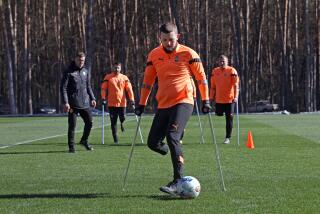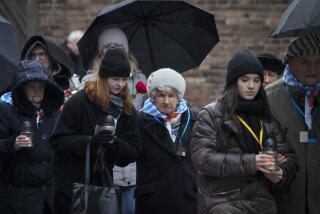Women of Bosnia Try to Rebuild
- Share via
VOZUCA, Bosnia-Herzegovina — The tiled-roof homes that are scattered on verdant hillsides around this village conceal the emerging demographics of Bosnia: Most are households of women, women alone raising children, their men--husbands, fathers, sons, brothers--killed in the massacres of war.
Wars mostly claim male victims. But in Bosnia-Herzegovina, where warriors bent on eradicating an enemy ethnic group decimated the male populations of entire communities, the plight of man-less women is especially acute. And in a patriarchal society where everything from identity to economic standing depends on men, the ability of these women to recover is limited.
Fadila Mehmedovic, 37, is one of more than 15,000 Muslim women who survived the Bosnian Serb takeover of Srebrenica, in eastern Bosnia, last summer. Her husband and two brothers are among the estimated 8,000 Muslim men who are missing. She labors to rebuild a life for herself and her six daughters, whose ages range from 2 to 18.
“Imagine losing everything you have--your husband, your home,” she said. “Life is not interesting anymore. . . . With only female children left, the line ends here.”
Mehmedovic and her daughters were resettled in Vozuca by the Bosnian government, which seems woefully ill-equipped to deal with the problems of female war victims. Government forces retook this central village from the Serbs just a few months ago; it has no electricity or health services and receives only occasional shipments of humanitarian aid.
“It would have been better if the men had lived and not us,” said Ibrisa Omerovic, a 40-year-old Muslim who lost her husband and two sons but survived the fall of Srebrenica with two daughters. “It is easier for men to start a new life.”
Omerovic and Mehmedovic are among the 1,700 families placed in Vozuca, in homes abandoned by Serbs. Here the women must haul kindling, draw water and till the fields. The Red Cross gave each family some hens.
In Bosnia, rural women, especially, have few marketable skills and little education. Many are illiterate--though most can count--and few have had to confront authority figures, be they police or bankers.
“They were housewives, they cultivated the land to support their husbands, they raised the children,” said Nejira Nalic, who runs a program for female refugees under the nongovernmental Bosnian Committee for Health in the northeastern city of Tuzla, where many Srebrenica survivors ended up.
“For them it is suddenly a quite different situation. It is quite difficult for them to understand what happens next,” Nalic said.
That sense of helplessness is only compounded by the keen emotional longing and loneliness from missing one’s partner, and the pain of not knowing what happened to him. In many cases Nalic has seen, a teenage child ends up managing the family because of his or her relative education and access to information.
*
Humanitarian and mental health workers say female refugees must confront layer upon layer of trauma. They have lost every element of their world, from husbands to homes to income, and often have witnessed atrocities--from the slaying of relatives to the shelling of their villages. In losing their men, most have lost their protection, their helpers, their anchors.
Dropped into a world with so little support, where both government agencies and aid organizations are overburdened, the women find their personal crises compounded, experts say.
Chances are slim that they will ever learn what happened to their men--or see someone pay for it. Finally, the experts say, intense depression can rob these women of the ability to mother. Some are so grief-stricken that they are unable to nurture or give care.
“Their cultural and social structures are gone, the fabric of their whole community is obliterated,” said Marcia Jacobs, a mental health advisor working with women in Bosnia for the U.S.-based International Rescue Committee. “Their ability to trust, their ability to connect to a new community, is destroyed. Reconnecting with a community is extremely crucial.”
To help prevent both physical and emotional isolation, counselors working with the widowed try to re-create social settings and encourage a healing form of communication and sharing. Many of the Srebrenica women have been placed in the local equivalent of therapy--put in groups, given coffee and knitting needles and encouraged to talk about what happened. Talking, Jacobs and others said, reduces trauma and other long-term psychological problems such as nightmares or sleeping disorders.
There are no reliable, nationwide statistics on the number of female victims here, but it is generally thought that the 3 1/2-year war in Bosnia claimed more than 200,000 lives and displaced almost 3 million people.
Bosnia still has men, of course; in fact, the plight of demobilized soldiers poses yet another challenge to the government, which must find jobs for tens of thousands of often poorly trained, traumatized 20- to 40-year-olds.
For communities like Vozuca, where women far outnumber men, those few able-bodied male survivors are in great demand. Mirza Avdic, for example, serves as the sole male figure for three families--his brother’s widow and children, his widowed mother and his own family. Mehmedovic, the woman with six daughters, receives help from her orphaned nephew, Midhat, who at 16 looks half his age and acts twice it, having taken on the swagger of a man with heavy responsibilities.
While Mehmedovic rues the end of her husband’s family name, Omerovic frets that she will never be able to marry again--there are too few candidates, she said, and who would want a woman with two daughters?
*
Srebrenica, a former U.N.-protected enclave until its capture, is perhaps the starkest example of a community robbed of its men.
But it is not the only one.
Four years ago this month, the men of Kasindolska Street also were taken away.
In a single, half-mile stretch of the residential street in Ilidza, a suburb of Sarajevo, 47 Muslim men were rounded up by Bosnian Serb separatists and were never seen again. Three days later, their women were expelled to Sarajevo, the capital, where they have persevered through mutual support.
When Serb-controlled Ilidza was given back to the Muslim-Croat government in March under terms of the Dayton, Ohio, peace agreement, the women returned to what was left of their homes on Kasindolska Street. Some even harbored the irrational notion that their missing husbands and fathers would suddenly reemerge. Now, they are doing their best to clean up the trash and repair the damage.
“We intend to come back and live here,” said Emina Hajdarevic, 44, whose husband and 19-year-old son were captured that day in May 1992. “We still have no idea when we can fix all this,” she said as she surveyed the ruins of her two-story home. “We are just women alone.”
Hajdarevic discovered a grenade left by the Serbs when she cleaned out her toolshed. And she recovered 23 bottles of whiskey her family had hidden under the house’s floorboards before the Serbs came.
When the Serbs fled Ilidza ahead of the Muslim-Croat takeover, they went on a rampage, torching homes, dismantling plumbing and stripping buildings of valuable parts.
“Everything that is within our ability to do, we did,” said Hajdarevic’s sister and next-door neighbor, Hata Hodzic, 37, who also lost her husband. “We cleaned up the garbage and put plastic on the holes that were once windows and doors.”
Hodzic’s husband survived the roundup on Kasindolska Street because he had been trapped on the Muslim side of Sarajevo several days earlier. But he disappeared in battle a year later. Several exchanges of bodies by the formerly warring factions have failed to produce any sign of him.
“My [11-year-old] son helps as much as he can, but it is still very difficult,” Hodzic said. “I am constantly missing my husband, in everything and at every moment. The worse thing is not knowing where the body is--could he be alive?”
*
Indeed, uncertainty is perhaps the most unsettling barrier to recovery. The Srebrenica survivors, especially, languish in limbo, nurturing an unrealistic hope that their men are alive and that they will come home. With Bosnian Serb refugees already occupying the vacated homes of Srebrenica, and with Bosnian Serb authorities refusing to obey the Dayton requirement that refugees be allowed to go home, the women of Srebrenica stand little chance of seeing their dreams come true.
Their long-shot hopes are intensified with each discovery of a male survivor from Srebrenica or Zepa, the other eastern Bosnia “safe area” that was captured at the same time. Last month, six men emerged from the woods where they had been hiding since July.
Denial and a refusal to grieve end up perpetuating the trauma and exacerbating the wounds, say counselors who work with refugees.
They point to a positive phenomenon among some women: a determination to survive, to struggle on behalf of the family and, in some cases, to bond together, that overcomes the most dismal despair.
Mejra Kulo, who at 55 is the senior of the Kasindolska women and a kind of ringleader, manages to laugh and joke with the other widows. Before her husband vanished, Kulo said, she did not know how to write a check or drive a car. With the help of the others, she has conquered unimaginable hardships, she said.
“I used to be a lady, but during this war I carried wood on my back,” Kulo said. “These women and I were constantly together. We shared everything--bread, sugar, salt. They helped me stay alive.”
Hodzic agreed. “If nothing else, at least we can sit and talk,” she said. “When I feel really bad I can always call one of them and sit and chat.”
The women of Kasindolska Street are slowly putting their lives back together. Kulo has given a corner of her property to a man for farming vegetables, and in exchange he is helping her rebuild. But Hodzic and Hajdarevic said they have no money to repair the considerable damage to their homes. All have taken anxious interest in the recent discovery of a suspected mass grave near Kasindolska.
*
Long-term recovery is more of a question mark.
Humanitarian aid workers are worried that the focus of internationally financed reconstruction in Bosnia is on construction projects that require brawn and inevitably favor men.
To balance that, a few projects sponsored by the World Bank and the U.S. Agency for International Development are promoting the kind of “micro-enterprise” at which these women can succeed--namely, the creation of weaving, potato-planting and hair-dressing businesses.
Under one program, women are eligible for small loans of about $350. The amount is kept small, aid workers said, because most of the women would feel uncomfortable if burdened with a greater debt.
But all concede that only a tiny fraction of the women in need will be reached by the economic or psychosocial programs available. Of particular concern, say aid workers, is the government’s decision to settle Srebrenica women in remote villages like Vozuca, where they have no access to information or help.
The Muslim-led government has its own political motives--by moving Srebrenica survivors to villages held until recently by Serbs, it can more easily prevent Serbs from returning and thus better hold on to newly gained territory. At the same time, however, the government does face a crisis as it struggles to find homes for hundreds of thousands of refugees and displaced people.
“Everyone lost someone, everyone suffered. That’s what makes it so hard,” said Mehmedovic. Wearing a white scarf and several sweaters on her thin frame, she spoke in her new home in Vozuca as one of her daughters cooked eggs, that day’s lunch.
“I have to live, that’s my destiny,” Mehmedovic said. “We have to live here until we can go back to Srebrenica.”
More to Read
Sign up for Essential California
The most important California stories and recommendations in your inbox every morning.
You may occasionally receive promotional content from the Los Angeles Times.














